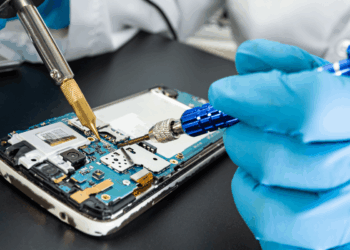Google is the latest OEM to get behind right-to-repair electronics legislation. The company announced Jan. 11 that it endorsed an Oregon bill it called a “compelling model.”
A press release noted that SB 542, a right-to-repair bill that died in Oregon in the 2023 session, “represents an inclusive compromise that brings tech companies, small repair companies, environmental leaders and legislators to the table to find common ground and support the repair movement.”
“This would be a win for consumers who are looking for affordable repair options, for the environment and for companies that want to invest in making their products more repairable and sustainable,” Google’s press release noted.
Apple has supported right-to-repair legislation lately, in California and at the federal level.
Pushing for ‘sensible’ rules
Google also published a white paper on how it’s supporting “repair and sensible right to repair legislation.”
The paper stated that Google “believes that users should have more control over repair – including access to the same documentation, parts and tools that original equipment manufacturer (OEM) repair channels have.”
“We strongly support initiatives that provide users with greater choice over the repair of their devices, that protect user safety and privacy and that provide manufacturers with flexibility to drive innovation and to meet users’ evolving needs,” the paper noted.
Google had nine areas it noted were central to “sensible” legislation. That includes user safety and protection from improper repair, a legislative scope of devices and parts covered under an OEM’s existing repair offerings and user privacy.
“User privacy and security should never be compromised during the repair process,” the white paper stated. “OEMs should not be required to provide any passwords, security codes or materials to override security features on devices. At Google, we introduced ‘Repair Mode,’ which helps users prevent access to all the data that’s on a device when it’s getting repaired, without the time-consuming process of backing up, wiping and restoring data.”
The white paper also emphasized focusing on repair outcomes rather than design mandates, a reasonable implementation period and prohibiting OEMs from imposing unfair anti-repair practices.
“For example, parts-pairing, the practice of using software barriers to obstruct consumers and independent repair shops from replacing components, or other restrictive impediments to repair should be discouraged,” the white paper noted.
Finally, any policy measures should align with existing rules across regulatory authorities within a given country, the white paper added, and policies should encourage repairers and recycling centers to recycle or to dispose of e-scrap responsibly.
“Google is committed to continue to push the envelope in our engineering and design, our repair programs and our public engagements to support repair and environmental sustainability,” the press release noted. “And we appreciate the efforts of policymakers, like we see in Oregon, to help move the entire industry towards a more sustainable and repairable future.”
Nathan Proctor, U.S. PIRG senior right to repair campaign director, thanked “all the people at Google who have championed repair and helped the company evolve from its previous opposition.”
The U.S. PIRG (Public Interest Research Group) has been a vocal supporter of right-to-repair legislation.
“Google’s support for a strong Right to Repair bill in Oregon, which includes critical parts-pairing reforms, gives me hope that we can tackle our tech trash treadmill and keep devices working longer,” Proctor said in a statement.

























